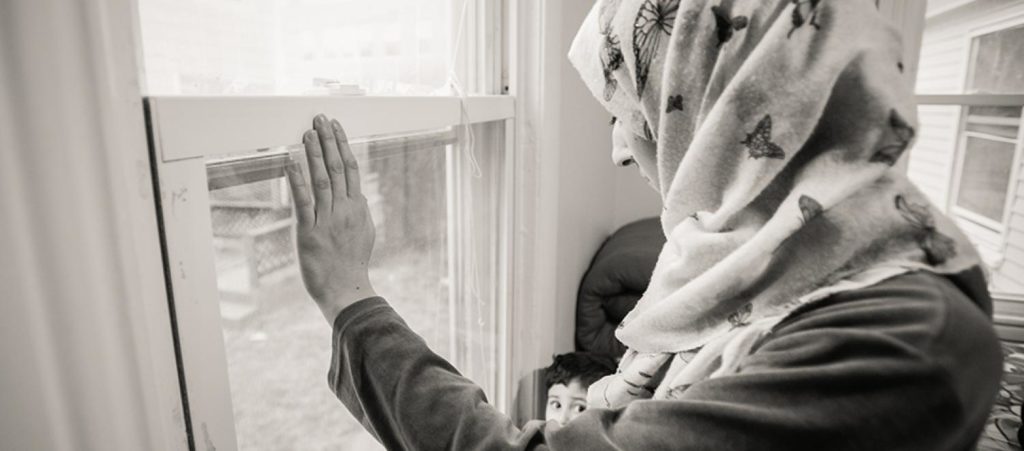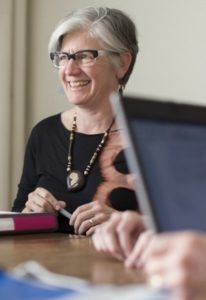
A low hum of chatter fills the dining room of the Worcester Senior Center as Anita Fábos describes the findings of Shared Worlds, a research project exploring the relationships between the city’s native-born and foreign-born residents.
But the voices buzzing throughout the room aren’t being rude — they are communicating. While Fábos speaks, five interpreters instantly translate her words for the non-English speakers in the audience. Fábos, associate professor of international development and social change at Clark University, and her research partner Cheryl Hamilton ’01, director of partner engagement at the International Institute of New England, note that language differences can impede relationships between natives of the United States and those who came from other countries. Most of the more than 100 people in attendance nod their heads.

A significant number of these immigrants arrived here under difficult circumstances. More than 2,200 refugees have resettled in Worcester, escaping war, persecution and natural disasters in countries that include Iraq, Burma, Bhutan and, most recently, Syria. The city’s refugee population comprises just over 1 percent of the total population, but Worcester has taken in more refugees than any other city in Massachusetts.
Clark University works closely with three Worcester agencies — Ascentria Care Alliance, the Refugee and Immigrant Assistance Center and Catholic Charities — to provide guidance and research as the agencies help newly relocated refugees, or “forced migrants,” deal with issues like enrolling their children in school and finding a doctor.
“We have worked with [these agencies] to help them better understand what affects the path refugees take toward livelihood in Worcester: what are the issues, similarities and differences between different populations as they strive to find work and plan for their financial and family future,” Fábos says.
Assistant Professor Marianne Sarkis has done work on health care and health expectations for incoming populations, while Associate Professor Jude Fernando works with community partners on micro-finance projects, such as entrepreneurial pathways to business and employment opportunities for refugees.
Another project has brought Clark students together with refugees to discuss the barriers to attaining higher education. In 2015, Fábos and her students researched the city’s refugee population and drafted a “demographic snapshot” in tandem with Clark’s Mosakowski Institute for Public Enterprise. The report identified areas for further research, such as looking at integration from the point of view of both refugees and Worcester natives.
That research led to the creation of Shared Worlds. The project takes an ethnographic approach that involves interviews with U.S.-and foreign-born Worcester residents to gauge their experiences and attitudes.
“It’s about that complicated, intangible piece that we call ‘belonging,’” Fábos says.
She points out that even immigrants who appear completely assimilated — they work hard, own a home, send their children to college — may not feel they are a part of the city.
“Integration is more than a one-way process,” she says. “You have to think about neighborhoods that typically had one kind of immigrant, and native Worcester residents are comfortable with that. But then come these immigrants who speak a different language, or have a different way of life, and that may give them pause. All of a sudden they don’t feel comfortable in their own neighborhood. Belonging goes two ways.”
Drawing on conversations conducted across the city and involving residents representing 44 different ethnicities and nationalities, Fábos, Hamilton and Clark students examine the question of what integration means today.
“Maybe it’s a transformation that’s always been happening; maybe we’re not looking at anything new, but it’s the latest configuration of ‘becoming Worcester,’” Fábos says.
Ahmed al-Rubaye is program coordinator at the Refugee and Immigrant Center’s Worcester office. He says the research conducted through Shared Worlds is valuable to the center’s work with refugees because little had been done to foster relationships between the refugees and native residents.
“The refugees begin to understand there is a willingness to help them,” he says. “If they feel accepted, they will integrate faster,” and they will be more likely to accept assistance from the center.
At the Senior Center presentation, Fábos explains that both groups of residents have contradictory feels of belonging; some foreign-born people find the city unwelcoming, while others sense great tolerance and inclusion. Some native-born Americans confess that they feared changes to the city and their neighborhoods. Fábos cautions that those attitudes should not be attributed to prejudice — often they result from a simple lack of awareness about an unfamiliar culture.
A Spanish-speaking resident at the Shared Worlds event acknowledges that some immigrants are hesitant to connect with their neighbors because they are shy or nervous, or merely unsure how to communicate with them. Several longtime Worcester residents insist that the city is far more integrated than it was when they were younger, but it can still be difficult to get to know people from other countries.
Many key interactions between refugees and their neighbors occur at school or work, or through a child bringing home new friends from other cultures and backgrounds.
“You just work them into your life,” Fábos says. “It’s a multipronged set of relationships and intangible connections that help you make meaning of your new life in a new place. It’s sharing your world.”


